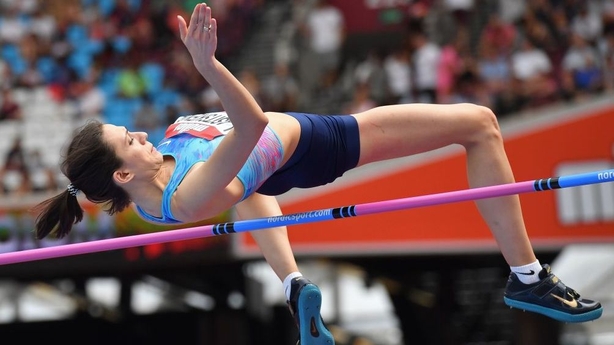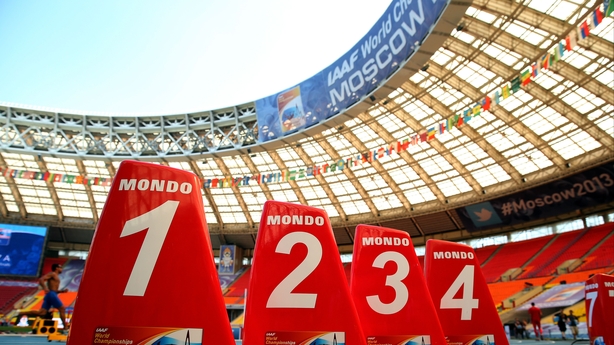If Russian hurdler Sergey Shubenkov retains his world title in London next week he will not be serenaded by his national anthem when he stands on the podium.
Shubenkov and 18 compatriots - the Irish team is just 12 - will compete as neutral athletes at the World Championships, the biggest international meeting to include Russians since their country's athletics federation was suspended nearly two years ago over an independent World Anti-Doping Agency (WADA) report that exposed the country's widespread state-sponsored doping.
The games begin at the former Olympic stadium on Friday.
"I want everything to be like in 2015," Shubenkov said, referring to the gold medal he won in the 110-metres hurdles at the last worlds in Beijing.
"Everyone understands who they are representing," sports minister Pavel Kolobkov
With their federation still suspended, dozens of Russians have been cleared to compete internationally after demonstrating to the International Association of Athletics Federations (IAAF) that their training environment meets the required anti-doping standards.
Although some semblance of a Russian squad is returning to the international stage after missing last year's Rio Olympics, Russian athletes in London will be barred from wearing their country's symbols and colours, down to hairbands and nail polish.
Russian authorities, who have vehemently denied the existence of state-sponsored doping, have generally accepted athletes' efforts to compete as neutrals.
"Everyone understands who they are representing," sports minister Pavel Kolobkov told reporters at Russia's national athletics championships last week.
"It will be difficult for the athletes to compete because they are patriots."
Many of the Russians set to compete in London say that the absence of their flag is but a minor annoyance that neither dims their love for their country nor affects their focus.
"I try not to think about it, not to give it any importance," Shubenkov said.

World champion high jumper Maria Lasitskene -- whose personal best, a 2.06-metre jump recorded last month, is three centimetres off the world record -- said that the possibility of retaining her title was more important than the colours she would be wearing.
"I'm competing as a neutral but what's most important for me is to show results, to defend my title," she said.
Russian athletes cleared by the IAAF say the long hiatus from international competitions has hurt their development as much as their income.
"It's tough to motivate yourself when you are competing against those with whom you train every day," sprinter Kseniya Aksyonova, who was cleared to compete by the IAAF but met the entry standard for London only after the deadline, told Reuters.
The Russian federation's decision to hold the national championships after the entry deadline for the worlds ultimately deprived three athletes, including Aksyonova, of the chance to compete in London.
"I understood that the chances to qualify were gone," Aksyonova said. "That lifted a weight off my shoulders."

A return to the fold remains unlikely before 2018 after the head of the IAAF's Task Force, Rune Andersen, said on Monday that Russia had yet to meet several of the criteria for reinstatement and the IAAF's coucil unanimously approved a recommendation to continue the suspension.
Drug-testing was still insufficient and banned coaches were still operating freely, Andersen told reporters in London after a presentation to the Council, saying: "There are still issues to be resolved."
Claiming "material progress" has been made, Andersen said the main issue is that "no meaningful testing is being conducted" because the Russian anti-doping agency RUSADA remains suspended by the World Anti-Doping Agency (WADA) and there is little prospect of that changing until November, at the earliest."
Perhaps the biggest obstacle - for the IAAF, WADA and Russia - is Russia's reluctance to acknowledge the findings of the independent report into its state-run doping programme by Canadian legal expert Richard McLaren.
"We haven't outlined in detail with (the Russian federation) or the authorities how they deal with the acknowledgement, or a potential rebuttal of the findings, but that has to be delivered by the Russians," said Andersen.
"We need some sort of explanation as to how they will deal with the issues raised by McLaren, so it's not just something they put aside or say it was all falsified, as they did in the beginning, although that has changed a bit."
The Russian federation's chief Dmitry Shlyakhtin will address all of the IAAF's members during the two-day congress later this week but few are expecting him to apologise for his country's behaviour.

